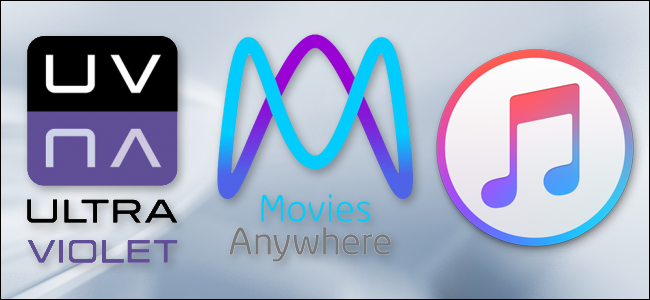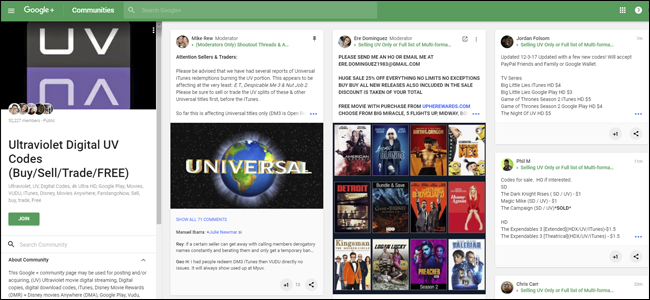At the moment, we're in a transition to an all-digital world of entertainment, and we'll soon be able to more or less forget about DVDs, CDs, Blu-rays, and game cartridges. But while we sit in this transitory phase, movie studios are trying to get us to keep buying movies on disc by sweetening the pot with free codes for digital copies.
But what if you don't want the code that comes free with your Blu-ray? Or alternately, what if you don't give a toss about the Blu-ray but you want to save some cash on that $15-20 digital HD price? Luckily, the web is full of free markets that are taking advantage of these cracks in the digital economy.
Buying Codes From Online Marketplaces
If you want to buy digital movie codes, especially for the somewhat cumbersome UltraViolet standard, you're spoiled for choice. Various websites keep a huge database of active, legal codes from movies, allowing you to buy them like any digital item and get the code delivered via email or a sign-in account. Here are a few of them:
You can also buy codes from ordinary user-to-user markets like eBay, or even Craigslist (if you like to live dangerously). Redbox recently started selling the Disney movie codes that come with the copies of movies they rent out, though for some reason you still need to go to the physical vending machines to actually get the code.
Once you've received the code for the movie in your email inbox or account page, you can redeem it whenever you like. UltraViolet codes can be used on VUDU or Fandango. iTunes-only codes are, well, iTunes only, but Disney Anywhere codes can be redeemed on iTunes, VUDU, Google Play, or Amazon. From there it's just a matter of opening the corresponding app on your phone or set-top box and watching the movie.
Selling Your Own Codes
First of all, you should understand that selling the digital codes from your DVDs and Blu-rays isn't going to be some avenue for extreme profit. You might pick up a few bucks here and there, but it won't recoup the cost of the disc itself, and it's honestly easier just to send the code to a friend or family member if you know you won't be using it.
But if you're set on selling that code, there are a few places to start. eBay is pretty good if you want to make sure you're protected by PayPal or credit card payment systems: just make an auction or Buy It Now listing and wait. You'll be competing on one of the biggest retail marketplaces in the world, mind you---if you actually want your code to sell you need to make it a dollar or two cheaper than the same movie is going for in other listings. Any other user-to-user market will work the same way.
There are also dedicated forums and social network groups for trading and selling UltraViolet, iTunes, and Disney Anywhere codes. Blu-ray.com, which is a combined storefront and user forum (not officially affiliated with the Blu-ray standard), offers a specific section of the forum for trading the codes that come with Blu-ray movies. There's a very active Google+ community dedicated to the same topic, with moderators apparently running a very tight ship. In both cases, PayPal seems to be the exchange of choice: post which movies you have and how much you'd like for them, wait for a private message via the forum or Hangouts, and send the code when you get the PayPal alert.
Of course, when you sell directly to people over the web, you run the risk of getting scammed, both for buying and selling. But since the prices for full movies are often less than a digital HD rental, and if you're selling the code you weren't planning on using anyway, the risk is minimal. Just remember never to offer your personal information, especially bank account numbers, credit card numbers, home addresses, and government identification.
Is This Legal?
The legal consensus on selling digital movie codes from Blu-ray and DVD packaging seems to be a resounding "eh." The terms of service of the movies definitely indicate that the movie studios don't want you to do this. "Not for sale or resale" is pretty clear-cut. In fact, Disney is currently suing Redbox to try to stop them from offering the digital movie sales mentioned above, and eBay's policy seems to be inconsistent at best.
That being said, the doctrine of first sale (which is active in the United States, with similar laws and statutes in other countries) pretty clearly applies to the movie code, since it's a separate item from the movie disc itself. So selling the code is probably legal, in the sense that it's a thing that you own---just because it's a bundled item from the Blu-ray or DVD doesn't affect its value as a separate item. But thanks to the byzantine rules and laws surrounding copyright, it might be illegal to redeem the code for a streaming movie if you don't have the disc that it was sold with. Movie industry lawyers would certainly make that argument, if indeed they found it worthwhile to prosecute this relatively small slice of a secondary market at all. That doesn't seem very likely, at least in the short term---movie studios are more interested in finding and prosecuting pirates than people who go out of their way to "buy" a movie, even in such a circuitous manner.
But yes, redeeming a movie code you obtained without actually buying the movie disc probably violates the terms of service, and technically either the studio or the service you redeemed the code on (VUDU, iTunes, Google Play) could revoke your ownership or suspend your account if they find out. Since there's no way for the studios or the service to know who bought the movie at a retailer and who redeemed the code, however, the practical danger of this is pretty low.
Special thanks to Professor Derek Bambauer of the University of Arizona for guidance on the final section of this article. Prof. Bambauer founded the James E. Rogers College of Law's Intellectual Property Clinic, which offers free legal assistance to entrepreneurs and start-ups.



